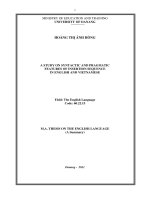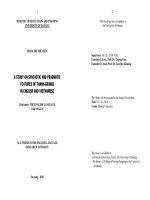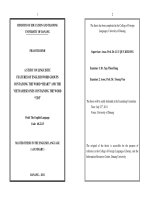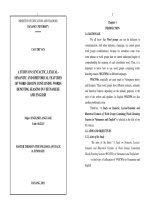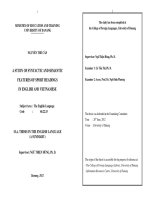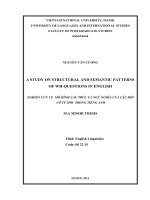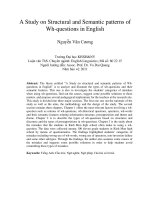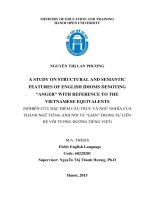A Study on Syntactic and Semantic Features of Dimensional Expressions Denoting Unlimitedness in Eng...
Bạn đang xem bản rút gọn của tài liệu. Xem và tải ngay bản đầy đủ của tài liệu tại đây (123.53 KB, 26 trang )
MINISTRY OF EDUCATION AND TRAINING
THE UNIVERSITY OF DANANG
LÊ HỒ THỊ HÒA
A STUDY ON SYNTACTIC AND
SEMANTIC FEATURES OF DIMENSIONAL
EXPRESSIONS DENOTING
UNLIMITEDNESS IN ENGLISH
AND VIETNAMESE
Field : THE ENGLISH LANGUAGE
Code :
60.22.02.01
M.A. THESIS IN SOCIAL SCIENCES AND HUMANITIES
(A SUMMARY)
DANANG, 2015
The thesis has been completed at
THE UNIVERSITY OF DANANG
Supervisor: Ph.D. TRẦN QUANG HẢI
Examiner 1: Assoc.Prof.Dr. TRẦN VĂN PHƯỚC
Examiner 2: Assoc.Prof.Dr. PHAN VĂN HÒA
The thesis was be orally defended at The Examining Committee.
Field: The English language
Time : 15th August, 2015
Venue : The University of Danang
The thesis is accessible for the purpose of reference at:
- Information Resource Center, The University of Danang
- The Library of University of Foreign Language Studies,
The University of Danang
1
CHAPTER 1
INTRODUCTION
1.1. RATIONALE
To say how long, how deep, how high or how wide something
is by using the metric system is rather easy for English learners;
however, it’s difficult for them to describe the length property, the
depth property , the height property, the width property or other
aspects of life that are unlimited, boundless, infinite or that is free
from restrictions. In fact, without dimensional expressions denoting
unlimitedness, people cannot describes something , Let us consider
the following examples of dimensional expressions of the
unlimitedness in English and Vietnamese.
(1) “…At the rear things were on even a more spacious scale
than at the front. There were great stables, where a dozen grooms
and boys held forth, rows of vine-clad servants’ cottages, an endless
and orderly array of outhouses, long grape arbors,green pastures,
orchard and…..” (The Call of the Wild, Jack London)
(2) “…., người ăn mày co rúm ở xó hè ri ri tiếng muỗi và đống
rác cao ngất này,... Thì ra từ khi đi ra khỏi chốn quê hương đồng
ruộng bát ngát đến giờ chẳng lúc nào Bính khơng ghê sợ vì cảnh vật
xung quanh mình. ….., mé trên mắt bên phải vẹt hẳn một nửa lông
mày dưới vết dao chém sâu hõm”.(Bỉ Vỏ, Nguyên Hồng)
In Example (1), the meaning of “Length” was implied by
differrent adjectives “long”, “endless” according to writer’s
implication.
In example (2), Nguyen Hong used “ngất”, “bát ngát”, “hõm”
to denote the unlimitedness; but different dimensional expressions
of unlimitedness were used to describe various aspects of meaning
“cao”, “ rộng”, “sâu”.
2
That leads to some semantics difficulties for learners of
English as well as translators.
Regarding the syntactic aspect, Vietnamese students may pay
no attention to the positions of words in a noun phrase or in a
sentence. For example, they may translate the phrase “Những giây
phút chờ đợi dằng dặc ” into English as “Moments of waiting
interminable”, in fact, it must be
“Interminable moments of
waiting”.
So far
attempts have been made to study dimensional
adjectives such as high-low, tall-short, long-short, deep-shallow,
thick-thin, wide/ broad-narrow, idiomatic phrases containing words
denoting numbers…Yet, there has not been any research done into
dimensional
expressions
describing
unlimitedness,
which
is
supposed to be an exciting but problematic area of study.
For above reasons, a research on "syntactic and semantic
features of dimensional expressions denoting
unlimitedness
in
English and Vietnamese " is chosen to carry out in the hope to bring
some theoretical and practical value for both linguistic study and
language teaching methodology.
1.2. AIMS AND OBJECTIVES OF THE STUDY
1.2.1. Aims
This thesis is a study of syntactic and semantic features of
dimensional expressions denoting unlimitedness (DEsdU) in English
and Vietnamese. This thesis is expected to help Vietnamese learners
as well as English learners be aware of the differences and
similarities in syntactic and semantic features of DEsdU in English
and Vietnamese.
3
1.2.2. Objectives
- To find out and collect DEsdU with high frequencies in
English and Vietnamese.
- To describe, analyze , and classify DEsdU in terms of syntax
and semantics in both English and Vietnamese.
- To identify the differences and similarities of DEsdU in both
languages in terms of syntax and semantics
- To suggest some implications for of the study of DEsdU for
teaching and learning DEsdU in English and Vietnamese .
1.3. SCOPE OF STUDY
This research paper primarily focuses only on the analysis of
syntactic, semantic features of DEsDU in both English and
Vietnamese with a view to finding out their similarities and
differences .The thesis is only based on English and Vietnamese
novels written from the 20th century
1.4. RESEARCH QUESTIONS
To achieve the aims and objectives above, I tried to answer the
following questions:
(1) What are syntactic and semantic features of DEsdU in
English and Vietnamese?
(2) What are the similarities and differences of the dimesional
expressions indicating the unlimitedness between English and
Vietnamese in terms of syntactic and semantic features?
(3) What are the implications for English teaching, learning
and translation?
1.5. SIGNIFICATION OF THE STUDY
With an in-depth interpretation of what is really meant by the
dimensional expression denoting unlimitedness and its synonyms in
specific contexts, as well as a proper use of such expressions in
4
varying ways, learners will be able to improve their understanding of
the field and obtain their final goal - successful communication. And
the findings of semantic categories of these expressions will be
expected to be of great benefit to Vietnamese learners of English.
Hopefully, doing a research of dimensional expressions in English
and Vietnamese will be a contribution to the study of linguistics.
1.6. ORGANIZATION OF THE STUDY
This thesis is divided into five chapters.
• Chapter 1: Introduction.
• Chapter 2: Literature review and theoretical background
.
• Chapter 3: Methods and procedures.
• Chapter 4: Discussion of findings.
• Chapter 5: Conclusion and Implications.
5
CHAPTER 2
LITERATURE REVIEW AND THEORETICAL
BACKGROUND
2.1. A REVIEW OF PREVIOUS STUDIES RELATED TO THE
THESIS
Clark, H.H. [23] studied spatial relations which are mainly
involved to the physical environment and human being physical and
cognitive prerequisites. He introduced the terms P-space and Lspace.
Lyons, J. [49] suggested a system regarding the DAs in
English (long, short, high, low, deep, shallow, wide, narrow, thick,
and thin.)
Cho, S.W. & O’Grady, W. studied DAs such as big, small,
tall, long, short, high, low, thick, thin, wide, narrow, deep and
shallow.
Dirven and Taylor [29] referred to global characteristics such
as profile against the background as well as to a dynamic interaction
with the environment in the case of tall.
Taylor, J.R. [62] discussed the semantic structure of two
prototypical adjectives: “tall” and “small”.
Moreover, the matter has been researched by Nguyễn Thị Dự
[6] with the study of DAs to describe people, the adjective “deep” in
English or the spatial language in Vietnamese.
Đỗ Hữu Châu [4] proposed DAs such as dài- ngắn, rộng-hẹp,
to-nhỏ, lớn-nhỏ, cao-thấp, sâu-nơng, dày-mỏng, ect.
Hồng Thị Hoa [36] focused on analyzing syntactic and
semantic features of some dimensional adjectives in English,
pointing out the Vietnamese equivalents of some English adjectives
6
investigated, finding out the similarities and differences of
dimensional adjectives in the view of the syntax and semantics
between the two languages and making suggestions relating to
dimensional adjectives for teaching English to Vietnamese students
For Trần Văn Cơ [2], the verticality of the human body
decides the tallness and length of entities.
In Lý Toàn Thắng’s view [16], adjectives used to express the
attributes of spatial dimensions are cao, thấp, sâu, nông, etc.
2.2. THEORETICAL BACKGROUND
2.2.1. Cognitive Linguistics
a. Cognition
In the view of Peter Gärdenfors [32], cognition includes
“mental processes connected with understanding formulation of
believes and acquisition of knowledge”.
b. Brief Overview of Cognitive linguistics
Ungerer and Schmid [53] says that the language is
comprehended as an integrated part of our cognitive abilities.
Langacker [39] discerns three types of basic conceptual
entities. Finally, Lakoff and Johnson [43] suggest image schemas as
basic notions....
2.2.2. Language Space
a. Some viewpoints on L-space
b. General properties of L-space
Based on the researches into the semantics of spatial words by
Leech [47], Weirzbicka [67], Lyons [50], Talmy [61], Herskovits
[33], Lý Toàn Thắng [16, p.69] names some properties and spatial
relations.
Furthermore, Clark [23, p.48] summarizes that L-space has
properties that are identical with those of P-space.
7
2.2.3. Basic Notions related to the DEsdU
a. The Notion of Axis
b. Notions of Reference Points, Lines, Planes and Directions
2.2.4. Semantics - The Study of Meaning
Semantics is the study of meaning. In other words, it is the
study of how language organizes and expresses meaning. It typically
focuses on the relation between signifiers, such as words, phrases,
signs and symbols, and what they stand for, their denotata. Linguistic
semantics is the study of meaning that is used by humans to express
their emotions, ideas and thoughts through language. Therefore,
semantics is the study of meaning that is derived from the intentions
of speakers, their psychological states and socio-cultural aspects of
the context in which their utterances are made.
a. Lexical Semantics and Components of Word-Meaning
b. Types of Word-Meanings
c. Semantic Field
Ginsburg (1979) has stated that words may be classified
according to the concepts underlying their meaning. Jackson (2007)
has confirmed that the vocabulary is said to be organized into a
number of, partially overlapping, semantic fields. The field then
becomes ‘the context within which to establish meaning relations’
(p.92). Lyons (1996) distinguishes between "conceptual field" (a
structure of concepts on the semantic level, a structured conceptual
area) and "lexical field"
2.2.5. Synonyms
a. Definition of Synonym
b. Strict and Loose Synonyms
8
c. Distinguishing Synonyms
2.2.6. Context
a. Definition and the Role of Context
Different linguists seek to define context from point of view in
order to answer questions encountered in their own fields, and to
support their own ideas and theories.
b. Classification of Context
2.2.7. Collocation Range
a. Collocation
b. Collocations and Semantics
c. Collocations and Their Classification
2.2.8. Dimensional Expressions denoting unlimitedness
a. Definitions
Terms the reseacher uses in this thesis are understood as
follows
- Expression is a word or a phrase, especially an idiomatic
one used to convey an idea.
- Unlimitedness is the state of being unlimited or boundless,
or of being undefined.
- Dimensional expressions denoting unlimitedness is a word
(N, V, Adj, Adv,P...), a fixed group/ phrase (NP, VP, AdjP, PP...) as
an idiom, a collocation or a free group denoting the concept of
unlimitedness or containing words meaning unlimitedness
b. Semantic Features of EDEsdU in Dictionaries
c. Semantic Features of VDEsdU in Dictionaries
9
CHAPTER 3
METHOD AND PROCEDURE
3.1. RESEARCH METHODS
The study is designed in the qualitative research which is
based on the principle of combining some methods. Firstly, the
descriptive method is used to give a detailed description of particular
syntactic and semantic features of DEsdU in English and
Vietnamese. The descriptive method seems to be the main method
for the contrastive analysis. Secondly, the analytic method is also
indispensable. Analytic Method was in use when the DEsdU are
explored in the form of separation as well as correlation. The method
facilitated the observation of each component around these adjectives
or relation between them and other part in the contexts. Thirdly,
Contrastive Method was used to set up similarities and differences in
such a way that English and Vietnamese people used the DEsdU.
3.2. DESCRIPTION OF THE SAMPLES
About 400 samples were collected and classified from 20
English novels written and printed in the 20th century in England and
about 20 Vietnamese ones in Vietnam. The extracted samples were
words or phrases expressing unlimitedness in English and
Vietnamese ( 200 in English and 200 in Vietnamese).
3.3. DATA COLLECTION
3.4. DATA ANALYSIS
3.5. RESEARCH PROCEDURES
10
CHAPTER 4
FINDINGS AND DISCUSSIONS
This chapter is designed as a core of the study, having two
main parts. The first part describes syntactic features of some DEsdU
in English and Vietnamese. The second part concentrates on
semantic features of English DEsdU and Vietnamese DEsdU . The
results of the analysis will be qualitatively and quantitatively
presented to clarify the similarities and differences of DEsdU in the
two languages.
4.1. SYNTACTIC FEATURES OF ENGLISH DEsdU AND
VIETNAMESE DEsdU
4.1.1. Syntactic features of English DEsdU
a. English DEsdU occur as an adjective
- English DEsdU can be used as Attributive Adjectives within
nominal phrase
Table 4.1. Syntactic Features of DEsdU as Attributive Adjectives in
English
Syntactic function
Premodification
Attributive
Formation
- DEsdU + N
Examples
- immense jubilation,
endless work
- (d) + DEsdU + N
an
enormous
bouquet, her endless
annoyances,
his great moustache,
an
enormous
limousine
-(d)+ DEsdU+Adj+N - An enormous orange
moon, the enormous
stone-flagged kitchen
- (d)+ DEsdU+N+N - an enormous silk
neckerchief,
an
11
Postmodification
enormous
service
revolver.
-Numeral+DEsdU+N two
enormous
dishes.
N/NP + DEsdU
- an immense nightbird
high above them, the
trees
deep
with
shadows,
something enormous
-.English DEsdU can be used as Predicative adjectives
Table 4.2. Syntactic Features of DEsdU as Predicative adjectives in
English
Syntactic functions
Formation
Predicative
Slink
Cs
Examples
V+ -
are
infinitesimal,
seemed endless,
DEsdU
was
unlimited, was infinite
Co
S+V+NP+
..... showed them an
DEsdU
immense nightbird high
above
- English DEsdU in Prepositional Phrases
Table 4.3. Syntactic Features of DEsdU in Prepositional Phrases in
English
Formation
Examples
Preposition + DEsdU + Noun
into endless scrapes
Preposition + DEsdU + Adj with
+Noun
eyes
immense
brown
12
Preposition + (d) + DEsdU + behind
some
enormous
properties, to Paul's immense
Noun
chagrin, on this great journey
Preposition + (d) + DEsdU +Adj in
+ Noun
the
vast,
shadowy
auditorium
b. English DEsdU occur as a noun
Table 4.4. Syntactic Features of DEsdU as headword nouns in
English
Syntactic function
Formation
Examples
Pre- (d) + DEsdU
Modifiers - (d) + Adj + DEsdU
-its vastness, the vastness,
-its appalling immensity,
+ DEsdU -(d) +Adj +Adj +
DEsdU
the uncharted vastness, the
blue immensity
- (d) + genetive +
- a grey primordial vastness.
- the soul's immensity.
DEsdU
DEsdU
+Post-
Headword
-DEsdU
+Prepositional
- vastness of another mind,
immensity of rest.
modifiers phrase
- DEsdU +Relative
- the vastness and terror of
the immemse night which is
clause
roused and stirred for a brief
Nouns
while by the day…..
Pre-
- (d) +
- the immensity of pasion,
Modifiers DEsdU+Prepositional
the enormousness of it
+ DEsdU phrase
+Post-
- the bare immensity of the
modifiers - (d)+ Adj+
DEsdU+Prepositional
stony desert, that
swarming immensity of
phrase
colour
13
-its
-(d)+Adj+
appalling immensity revealed
DEsdU+Participle
phrase
from the rim to the rim.
c. English DEsdU occur as a verb in Verbal Phrases
Table 4.5. Syntactic Features of DEsdU in Verbal Phrases in English
Meaning
auxiliary verb (+ form Examples
of main verb)
Continuous
be + -ing form
was deepening
Perfect
had + -ed form
had not yet ended,
had only deepened
d. English DEsdU occur as an adverb in Adverbial Phrase
Table 4.6. Syntactic Features of English DEsdU occur as an adverb
in Adverbial Phrases
Formation
Adv
Examples
Immensely,
interminably,
eternally, infinitely
Adv + To infi
infinitely relieved to find he did
not take it tragically
Adv + PP
endlessly to both of them, deep
below the surface it piqued him
4.1.2. Syntactic features of Vietnamese DEsdU
14
a. Vietnamese DEsdU as attributive adjectives within the
nominal phrase
b. Vietnamese DEsdU as predicative adjectives
4.2. SEMANTIC FEATURES OF ENGLISH
DEsdU AND
VIETNAMESE DEsdU
4.2.1. Semantic features of DEsdU in English
a. DEsdU expressing Size, Dimension
Table 4.8. A Summary of the Basic Semantic Features of DEsdU
Size,
dimensions
Largeness
DEsdU
Vast
Immense
enormous
Smallness
Very small
tiny
infinitesimal
Height
high
Semantic features
Examples
express
the - Vast red
extremely
large hands
meaning of nouns
Immense
brown eyes and
vast
and
splendid
enterprise
- An enormous
comb
express
the -Tiny pansies
extremely
small - Tiny forgetmeaning of nouns
me-nots tiny a
spark
-Infinitesimal
compared with
the points of
similarity.
its usage for a - High over
vertical
distance the trees into
upward
from a the sky
15
Width
wide
vast
immense
immensity
depth
deep
speaker or a point - High in the
of reference
sky
- The moon
was high
- its usage for - A wide road,
objects with two or in
vast,
more dimensions.
shadowy
- its usage for auditorium
multidimensional
- A vast empty
objects having fixed room, the wide
orientation in space green lawn
- its usage for - The bare
objects extending immensity of
beyond the field of the
stony
vision.
(world, desert.
country,
ocean,
etc.)
- its usage for the - The deep sky
vertical dimension overhead
measured from a Deep
reference plane
wrinkles, the
- its usage for the deep
dark
inner measurements water far out
of traces or marks.
beyond
all
- its usage for the snares
and
vertical dimension traps
and
measured from their treacheries
bank or edge as - The deep
well
muddy pit like
as from the surface a man newly
of water to their struck blind
16
bottom
- its usage for a
canonical vertical
dimension of a
container that goes
far down from the
top or from the
surface inwards to
the bottom.
b. DEsdU expressing Number or Amount
Table 4.9. A Summary of DEsdU expressing Number or Amount in
English
DEsdU in
English
Semantic features
English Examples
Endless
- Its usage for a
large number of..
- Its usage for a
great deal of..
- her endless
Endlessly
End
Enormous
vast
annoyances
- endless accidents
- endless work
- questioned endlessly
about that angel talked
endlessly to both of
them had not yet
ended.
- an enormous musical
staff
- the vast quantities of
starchy food.
- vast amounts of food
17
c. DEsdU expressing Time
Table 4.10. A Summary of Duds expressing Time in English
DEsdU
Great
Limitless
Unlimited
Endless
Examples
- this great journey
- limitless future
- it was unlimited
endless hours
d. DEsdU expressing Degree
- DEsdU expressing the degree of emotions
Emotions here consist of our feelings, love, courage, sincerity,
attitudes and so on.
+DEsdU expressing the level of feelings
+ DEsdU expressing the level of other aspects of emotions
- DEsdU expressing the degree of something good
- DEsdU expressing the degree of something bad
4.2.2. Semantic features of DEsdU in Vietnameses
a. DEsdU expressing Size, Dimension
b. DEsdU in number or amount
c. DEsdU in time
d. DEsdU in Degree
4.3. SIMILARITIES AND DIFFERENCES BETWEEN EDEsdU
AND VDEsdU
4.3.1. Syntactic Features of EDEsdU and VDEsdU
a. Similarities
Syntactically EDEsdU and VDEsdU share some common
points. Firstly, both English and Vietnamese have dimensional
adjectives. Secondly, when occuring as an adjective , DEsdU in both
English and Vietnamese can be attributive and predicative
18
b. Differences
Due to the typical characteristics of each language, some
differences of the compound reinforcing adjectives between the two
languages are found as follows.
Firstly, unlike English DEsdU, the DEsdU in Vietnamese
rarely stands by itself but it is often preceded by the words such as
“cao, rộng, sâu...” to form the phrases like “cao chót vót, rộng mênh
mơng, sâu hoắn.....”
Secondly, DEsdU in English fall into a variety of parts of
speech : adjectives, adverbs, verbs and nouns (e.g. immense,
immensity, immensely, end...), while Vietnamese DEsdU always
occur as Adjectives
Third, in English, DEsdU must be an adverb to combine with
verbs of action, whereas in Vietnamese, they can combine directly
with a number of verbs. It is through this combination that an object
not only indicates actions but also enhances its concrete features.
Finally, When DEsdU are adjective, it is clear that in
attributive position, English DEsdU are placed before or after nouns
whereas Vietnamese DEsdU are put widely after nouns.
4.3.2. Semantic Features of EDEsdU and VDEsdU
a. Similarities
In terms of semantic analysis, the DEsdU fall into two groups.
The first group consists of the DEsdU expressing the descriptive
meaning that is the size or the shape of objects or people. The
DEsdU denoting what the speaker values or measures events,
problems belong to the second group.
b. Differences
